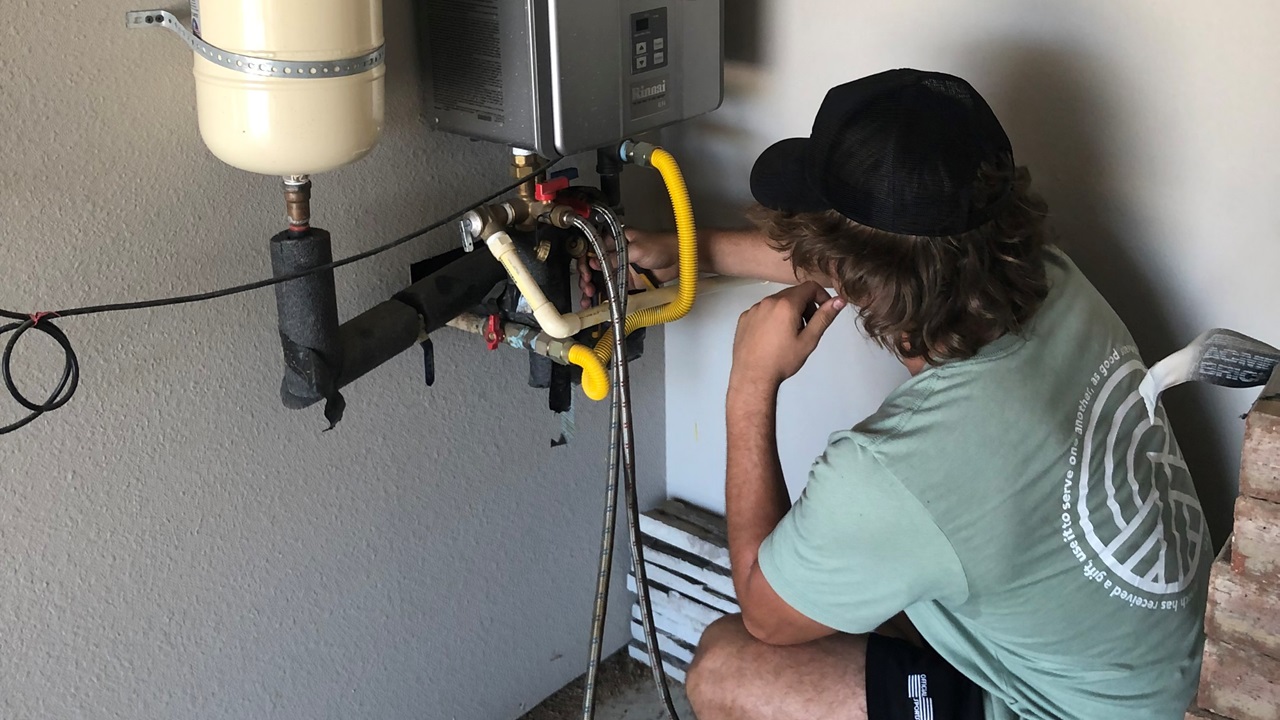

Introducing our tankless water heater maintenance service – the solution to keeping your tankless water heater running smoothly and efficiently for years to come.
As the popularity of tankless water heaters grows, so does the need for proper maintenance to ensure their longevity. Our professional and experienced technicians are here to help you maintain your tankless water heater, so you don't have to worry about unexpected repairs or replacements down the road.


With our service, you can rest assured that your tankless water heater will be flushed annually, or as recommended based on your water quality, to prevent the buildup of calcium particles and scale that can clog your plumbing and lead to costly repairs. Our team uses the latest tools and techniques to ensure a thorough cleaning, and we can even install maintenance reminders or remotely monitor your system for added convenience.
Don't let a lack of maintenance compromise the performance and lifespan of your tankless water heater. Trust our experts to keep it in top condition, so you can enjoy the benefits of efficient and reliable hot water whenever you need it. Contact us today to schedule your tankless water heater maintenance service and experience peace of mind for years to come.

Coming soon... a word from our clients!

The Vitality of Healthy Water: Nurturing Our Bodies and the Environment
Water, the elixir of life, is an essential resource that sustains all forms of life on Earth. From quenching our thirst to supporting the intricate ecosystems that thrive beneath its surface, water plays a pivotal role in our existence. However, not all water is created equal. The importance of healthy water, free from pollutants and contaminants, cannot be overstated. In this blog, we will explore the significance of healthy water for our well-being, the environment, and future generations.
Nourishing Our Bodies
Water is the cornerstone of human health and well-being. Our bodies are composed of about 60% water, and every bodily function depends on it. From regulating body temperature to aiding digestion, water is essential for maintaining a healthy body. Consuming healthy water ensures proper hydration, which supports brain function, metabolism, joint lubrication, and the transport of vital nutrients throughout our bodies.
Drinking clean, healthy water also helps prevent diseases. Contaminated water sources can harbor harmful bacteria, parasites, and viruses that lead to waterborne illnesses such as cholera, typhoid, and hepatitis. By promoting access to safe and healthy water, we can significantly reduce the burden of such diseases and enhance public health.
Protecting the Environment
The quality of water doesn't just impact human health; it is also crucial for preserving our environment. Healthy water ecosystems are home to a myriad of plant and animal species, providing them with habitats and sustenance. Aquatic ecosystems support biodiversity, maintain ecological balance, and contribute to the overall health of the planet.
Moreover, clean water sources are essential for sustaining agriculture and food production. Adequate water quality ensures the health and productivity of crops, reducing the need for harmful pesticides and fertilizers. By preserving and protecting healthy water sources, we can minimize the ecological impact of agriculture and safeguard our food security.
Promoting Sustainability
Ensuring access to healthy water is not just a present-day concern; it is also vital for future generations. As the global population continues to grow, the demand for water is increasing, placing strain on existing resources. By managing water resources sustainably and preventing pollution, we can ensure that future generations have access to an adequate supply of clean and healthy water.
Conservation efforts, such as water recycling and rainwater harvesting, can alleviate water scarcity and reduce the pressure on freshwater sources. Additionally, promoting education and awareness about water conservation and pollution prevention can foster responsible water use and stewardship among individuals and communities.
Taking Action: Steps Towards Healthy Water
To secure healthy water for ourselves and future generations, collective action is necessary. Here are a few steps we can take to contribute to this cause:
a. Conservation: Practice water conservation in our daily lives by fixing leaks, using water-efficient appliances, and being mindful of water usage.
b. Proper Disposal: Dispose of waste properly and avoid dumping hazardous substances into drains or bodies of water.
c. Support Policies: Advocate for policies that protect water sources, promote sustainable water management, and ensure access to clean water for all.
d. Education: Raise awareness about the importance of healthy water through education campaigns, community events, and sharing information on social media platforms.
e. Sustainable Practices: Embrace sustainable agriculture techniques, such as organic farming and responsible irrigation, to minimize water pollution and maintain soil health.
Conclusion
The significance of healthy water extends beyond our immediate needs. It is a vital resource that sustains life, nourishes our bodies, and supports thriving ecosystems. By valuing and protecting healthy water sources, we can enhance our well-being, preserve the environment, and ensure a sustainable future for generations to come. Let us recognize the importance of healthy water and work together
Continue from here: The significance of healthy water extends beyond our immediate needs. It is a vital resource that sustains life, nourishes our bodies, and supports thriving ecosystems. By valuing and protecting healthy water sources, we can enhance our well-being, preserve the environment, and ensure a sustainable future for generations to come. Let us recognize the importance of healthy water and work together towards its preservation.
One crucial aspect of protecting healthy water sources is reducing pollution. Industrial activities, agriculture, and improper waste disposal contribute to water pollution, contaminating rivers, lakes, and groundwater. By adopting sustainable practices and embracing eco-friendly alternatives, we can minimize the release of harmful chemicals and pollutants into our water systems.
Supporting organizations and initiatives that work towards water conservation and protection is another effective way to make a difference. Numerous non-profit organizations and government agencies are dedicated to preserving water quality and ensuring access to clean water. By donating, volunteering, or simply spreading the word about their work, we can contribute to their efforts and amplify their impact.
Education plays a pivotal role in shaping our understanding of water and its importance. By teaching children and adults alike about the significance of healthy water, we can instill a sense of responsibility and inspire positive actions. Incorporating water conservation and pollution prevention into school curricula, hosting workshops and seminars, and sharing information through various media platforms can all contribute to raising awareness and fostering a culture of water stewardship.
In addition to individual actions, policy changes and government regulations are crucial in protecting and promoting healthy water. Governments should prioritize investments in water infrastructure, such as wastewater treatment facilities and water distribution systems, to ensure the delivery of clean water to communities. Implementing and enforcing strict regulations on industrial and agricultural practices can help reduce pollution at its source. Collaborative efforts between governments, businesses, and communities are essential for establishing effective water management strategies and addressing challenges related to water quality and availability.
It is also vital to recognize the interconnectedness of water with other environmental issues, such as climate change. As global temperatures rise, water scarcity and extreme weather events become more prevalent. By mitigating climate change and adopting sustainable practices, we can help preserve water resources and mitigate the impacts of water scarcity.
In conclusion, healthy water is a precious resource that supports life, nourishes our bodies, and sustains the environment. Its importance cannot be overstated. By valuing and protecting healthy water sources, practicing conservation, supporting organizations and initiatives, and advocating for policy changes, we can ensure a future where clean and accessible water is available to all. Let us recognize the significance of healthy water and work together to preserve this invaluable resource for the well-being of ourselves, the environment, and future generations.
